MYTHENDER FATES
GOD OF JUDGMENT
who will pass judgment and enforce order throughout the worlds
The Dream of Judgment
Your Dream is filled with the wailing of troubled souls. Their prayers are filled with anguish. They offer sacrifice for an audience, seeking justice or mercy. Does your word bring them order? Peace? Regret?
Concept: Judge
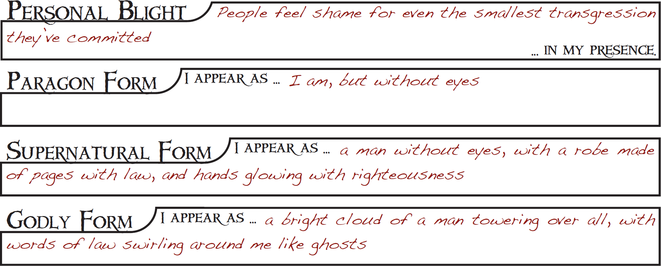
Concept: Executioneer
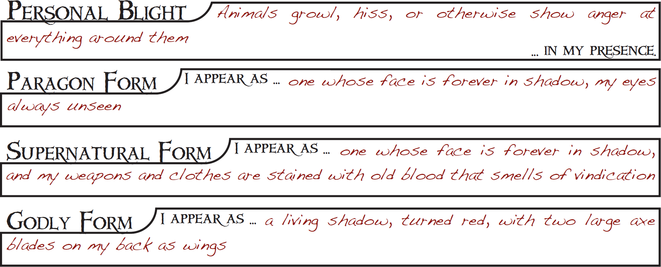
Judgment’s Powers over Mortals and the Land

GOD OF DEATH
who will rule viciously over the souls of the departed
The Dream of Death
Your Dream is littered with corpses. Dark beasts bring them in from all the land. The spirits of the newly dead are ripped from their bodies and brought before you. Are you judging them? Punishing them? Consuming them?
Concept: Mercy
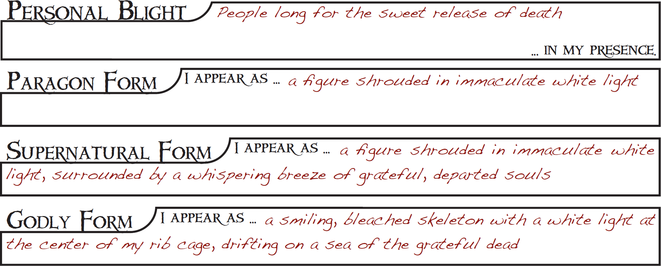
Concept: Decay
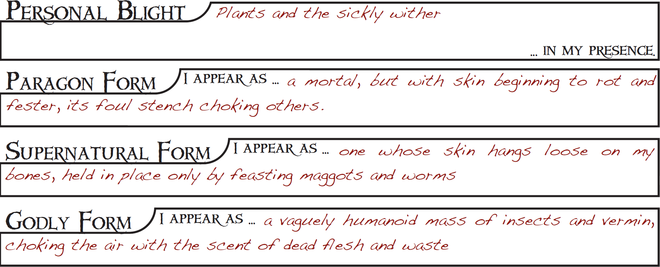
Death’s Powers over Mortals and the Land

GOD OF WAR
who will forever drench mankind in the blood of their foes and fellows
The Dream of War
Your Dream is of endless battle—blood-mist and the clash of steel. Mortals feed your thirsty battlefields with their lives, all for the chance of glory and honor in your name. What rewards do you promise the victors? What awaits the unworthy?
Concept: Warlord
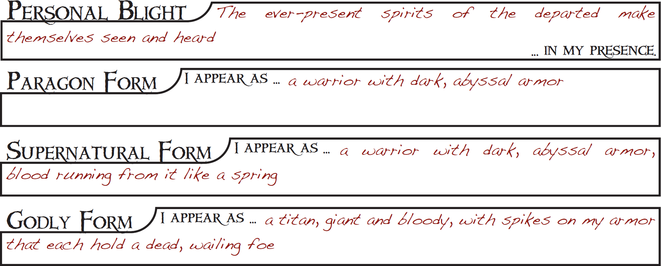
Concept: Eternal Warrior
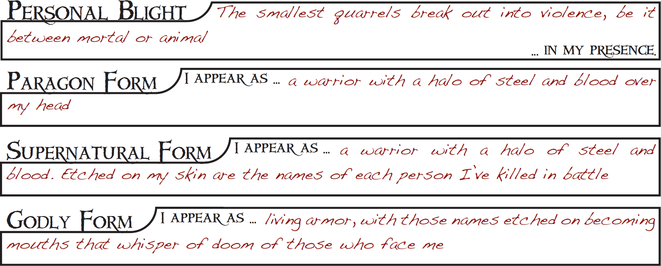
War’s Powers over Mortals and the Land

GOD OF LIFE
who will shape the cycle of creation with a firm hand
The Dream of Life
Your Dream is a tapestry of sunlight and wheat, of afterbirth and screams. You are the spark within every seed, the first heartbeat of every infant—and the last, should you will it. What lives are worth your blessing? What lives are not?
Concept: Lifegiver
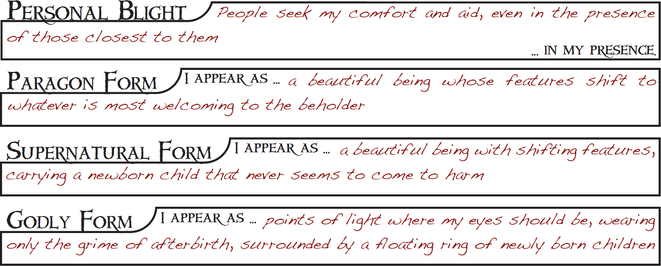
Concept: the Wild
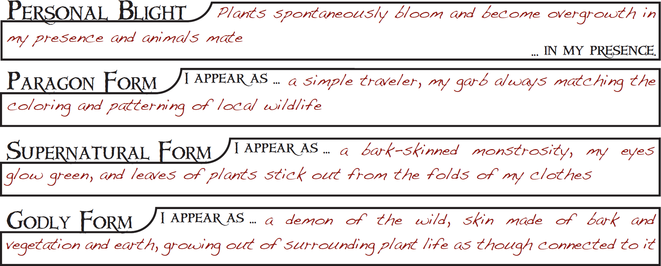
Life’s Powers over Mortals and the Land

GOD OF LOVE
who will force all hearts to wear chains of devotion and need
The Dream of Love
Your Dream is a lavish court filled with admirers. They surround you, singing and dancing and copulating and murdering at your whim. Do you taste the pain of heartache? Can a mortal be worthy of your love? Can you?
Concept: Siren
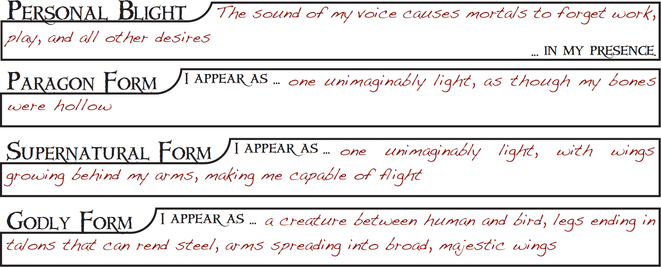
Concept: Virgin
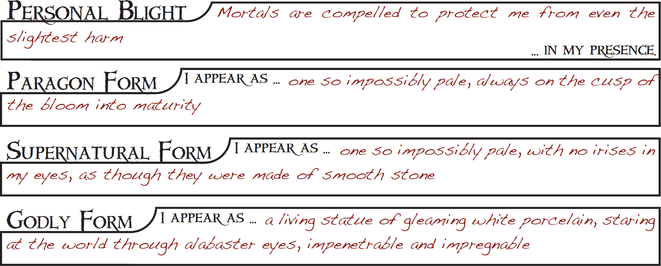
Love’s Powers over Mortals and the Land

GOD OF CHAOS
who will doom mortalkind to the beautiful whims of entropy and chance
The Dream of Chaos
Your Dream is a cacophony of savagery and lamentation. Mortals build and unite to fruitless ends, their hopes and dreams ending in ashes and dust. Is it your attention that destroys them, or your neglect?
Concept: Mad Prophet
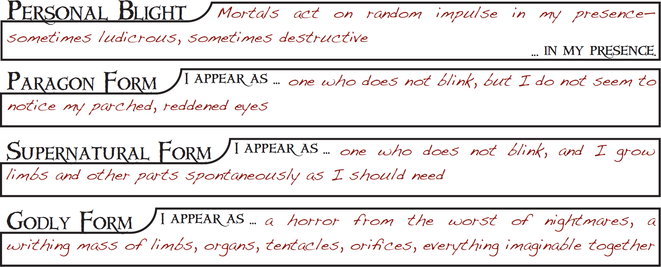
Concept: The Contemptuous
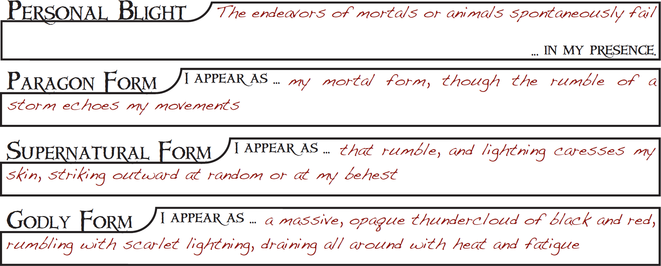
Chaos’s Powers over Mortals and the Land

MAKING NEW FATES
Fates are vastly different from Hearts and Pasts, because they’re more esoteric. Because of that, they aren’t filled with questions to answer, but options to choose from and alter to taste. The easy way to make a new Fate is to change the Personal Blights and Forms on one of the Fate’s options. Many people do this—and that’s great!
If, on the other hand, you’re making a new Fate from scratch, you’ll need to know if you’re making a broad Fate or a narrow one. The six in this book are broad; you can tell this because there are two different takes for each one, which are only unified by the overall theme (reflected in the Heart’s Dream and its nebulous questions) and the Fate’s Power Over Mortals. A Fate with only one strong interpretation that you can see is a narrow Fate, though over time it may become broader.
Key to making a Fate is making sure it’s inhuman and at best only slightly sympathetic. The God of Blacksmiths, for instance, isn’t just some dude who likes to work all day over hot metal, but a deity that abhors freeloaders and those who do not contribute to civilization—those people erode his power. The God of Hedonism isn’t just someone who likes to party, but one who needs mortals to engage in gluttony and debauchery, as that is his true food and drink.
When making a Fate, understand that the Fate’s Power Over Mortals exists for three reasons: to tell you what your Mythender can do that others can’t, to show you how your Mythender is pretty much already that god right now and should just give into Fate, and to give you and the Mythmaster ideas for Terrorizing Mortals for Power. Similarly, the Personal Blight exists as a tool for the Mythmaster to remind the Mythender at every turn that she’s not entirely mortal—especially when she’s trying to Seek Sympathy and Healing.
The only advice I can give on making specific Personal Blights, Forms, and Power have already been said in Damning Your Mythender. Look at the Fates in this book as examples for tone. Keep the Forms about appearance, not about how mortals feel—that’s key to making a Personal Blight function in the story, as well as making Terrorizing Mortals the Mythender’s choice rather than an accident based on the current Form.